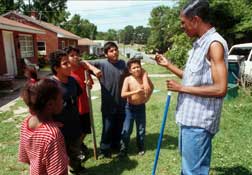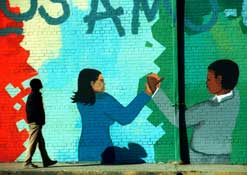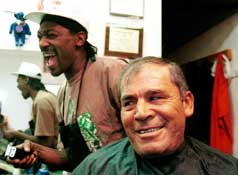 |
 |
|
 |

New Immigrants and Neighborhood Change: Northeast Central Durham
Woman with Children in Front Yard of Durham Home
 |
 |
The Southern Oral History Program's "Listening for a Change" initiative
in the Northeast Central area of Durham, North Carolina, is exploring the impact
of the growing Latino population in a low-income neighborhood historically populated
predominantly by African Americans. Interviewees include African American, Latino,
and Anglo residents who describe the evolution of life, work, and social patterns
in the neighborhood. Project coordinators Alicia
Rouverol and Jill Hemming are focusing on the themes of assimilation,
ethnic and political identity, and identity formation, as well as examining cross-cultural
issues such as retention of past traditions, relationship to home country,
the immigrant experience in work, church, and social settings, and the
creation of cultural and social institutions like local markets and newspapers.
Interviewers are following immigrants' stories chronologically, from
life and work in the home country to the journey to the United States
to the creation of a new home in Durham. By documenting the lives of
men and women within a discrete neighborhood, across a range of ages,
and from a host of Central and South American countries in addition to
Mexico, the interviews reveal a rich fabric of community life and help
to illuminate how North Carolina communities continue to be shaped by
the experience of immigration.
With support from the North Carolina Humanities Council, Rouverol and Hemming
organized a community banquet and cultural program entitled "Gathering Neighborhood
Voices," which drew more than fifty Northeast Central residents together
in
September 1999 for Latino and Southern home cooking, performances by
local musicians and dancers, and lively discussion. Neighborhood leaders
spoke with invigorating candor about the tensions between black and Latino
populations and shared ideas on fostering interracial and cross-cultural
cooperation through a better understanding of each other's historical
experience. Further plans for community outreach include a choreographed
movement piece for elementary schools, a community mural, a video, a
community history booklet, and a CD-ROM multimedia presentation. Hemming
and Rouverol have involved a team of community liaisons and interviewers
in their work, including Katushka Olave, Jacquelyn Wagstaff, Colin Austin,
Ciro Arroyo Vicente, Angela
Hornsby, and Ann Kaplan.
|
 |
 |



